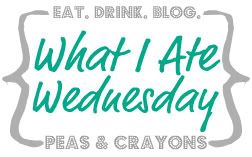"Thank you, thank you, for normalizing (re-normalizing?) normal food and normal eating! As a mom, I am also doing my best to give these attitudes to my family. My challenge, besides the fact that I deal with my own food issues, is an overeating spouse who likes to bring the child along on his path. Would you ever address anything like that? How we, with food issues, deal with being responsible in our families for being the provider of nutrition and shaper, to some degree, of the attitudes there? I always look forward to your posts! Thank you!"
 |
I grew up on Whoopie Pies but I prefer a
good scone these days. |
Thank you, SC Grace, for asking and prompting this post. It is not too late to change your eating, nor to model a healthy relationship with food, even if you've struggled during your own childhood. So I'll share a bit about my own experience as a child, a young adult, and as a mom.
I grew up on Lucky Charms and Capt’n Crunch for breakfast. Mayonnaise sandwiches on Wonder white bread was my frequent snack of choice which I'd help myself to; I’d pull a chair up to the refrigerator to reach the shiny metal bread box at the top, clad in my Pjs, while my mom slept early am—I was preschool age then. I don't think I was sneaking—although I don't know what she'd have said if she found me climbing above the fridge and eating.
I ate everything, including cooked-to-death canned vegetables—I loved the rubbery mushrooms and the flaccid asparagus spear pieces the best—and fried liver and onions. Really. Casseroles made with those goopy canned soups—high in fat, saturated fat, and sodium, and low in fiber—these were the norms. And I guess even then I paid attention to how I experienced food. I was free to eat cookies—and ice cream and cakes—but only after I finished my meal. Somehow that was never a problem for me. I do recall many a comment about what an appetite I had. Yes, compared to sedentary adults who were not growing, my needs, like those of all growing children, were great.
 |
I never encouraged grapefruit--it was just always one of his favorites.
Go figure. |
Then my mom went through her dieting jags. I turned to grapefruit and dry toast with black coffee and salads for lunch—just vinegar, please. Fish, cooked dry—and it tasted it—with merely a sprinkle of all-the same-on-everything seasoning. Oh, and plenty of cottage cheese—low fat of course. No fresh garlic, just powdered. No herbs. No tasty olive oil. Minimal pleasure, I’ll add.
 |
| Yup, it's me in my college years. (As promised, Cate!) |
And when I was college age and gained more than the freshman fifteen, I was told that I could use to lose about 20 pounds. There was no exploration of the why, no guidance on the how. My mom did instruct me to hold my stomach in, however. I restricted my eating at times, and binged at others. I became rigid about how things were prepared (heaven forbid there was something added that I didn't know about) and I even had a short-lived period as a vegetarian.
Fast forward
Over the years, my own eating normalized. Yes, I realize that's a rather passive statement. I can't quite say how it happened, though, as I never sought help—I never had something one would have known how to label back then. By today's DSM, I'd be labeled a restrictive binge eater.
And then, of course, I became an RD, and after some years, had a family.
 |
| Some things will come intuitively--if you let them be. |
In spite of my profession, my sons were the least educated of all their classmates in areas of food and nutrition. They didn't know a carb from a fat, and were never taught that they had to finish their 'healthy' food before eating dessert. Ice cream was an acceptable snack—when it was eaten in the kitchen, at the table, no TV in sight. French toast, pancakes and waffles with real maple syrup the norm in our home. They did know that Frosted Flakes was more candy then cereal—and they were tuned in to be critical viewers of the media. It never struck me as problematic when my son had a fuller build, appropriate before his adolescent growth spurt.
In their later years of high school and into college the discussions began. They wanted to know if what they were hearing was true—like whey protein for muscle development? And what’s the story about eating late at night? And are refined carbs as bad as they say?
But really, they already knew the answers. They knew from seeing how we ate that a varied diet was appropriate. And they heard that food was something to be consumed both for fuel and for pleasure. They learned that food was neither to be used as a treat, a reward for good behavior, nor to be withheld as a punishment for bad behavior nor for eating too much. And they had learned to trust their bodies.
And now?
I just spent 4 days on a mini vacation with my husband and my 2 20+year old sons, and what I heard and saw only reaffirms this parenting approach.
I learned that my elder son mixes his cereals at work, where he eats breakfast daily on workdays. Approximately one third is Frosted Flakes, 2/3 regular Cheerios. Or, there's Kashi Heart to Heart—with a bit of Lucky Charms thrown in—for sugar, or maybe even nostalgia, I suspect. And at our local dairy where the ice cream is oh-so-rich and the portions are crazy large, my almost 6'2” boys order a ‘kiddie’—a single scoop—because it’s just as much as they need.
My adult kids enjoy fine food out—and their share of cheap, quick food—but in moderation. Son #2 would choose fresh blueberries or a fruit laden dessert over chocolate any day. And they’re both as excited about the farm-fresh tomatoes we’ve recently gotten as I am. Meals are eaten at the table—eating in the bedroom or the family room is just not happening—at least when they're home; I can’t speak for what happens in their own space.
 They might be momentarily engaged with some texting, but for the most part, meals are mindfully consumed. They talk about the flavors—their preference for one vinegar or oil over another—and they choose foods they enjoy. They are foodies—with all that connotes—but mostly it speaks to their appreciation for how food tastes. Both my sons enjoy eating—and cooking.
They might be momentarily engaged with some texting, but for the most part, meals are mindfully consumed. They talk about the flavors—their preference for one vinegar or oil over another—and they choose foods they enjoy. They are foodies—with all that connotes—but mostly it speaks to their appreciation for how food tastes. Both my sons enjoy eating—and cooking.
As for spouses: I could never have raised my kids as I did if my husband countered my messages with talk of 'good foods' vs 'bad foods'. Or if he told them that they couldn't have seconds. Or if he continually prompted them to eat—even if they weren't hungry.
Most important, talk to your partner so you can be consistent in the message you put out there. And when your spouse isn’t on board, address the issue away from the ears of your children. Arguing around food is the last thing you want to be doing. Food and eating shouldn’t be stressful.
Educate your partner—do they get it? Maybe they have no reason to get it, given little personal experience with a food struggle. Or maybe they are so stuck in their patterns that they aren’t too self aware. Perhaps you can make the connections for them. They just might need some direction.
Remember it's not too late to modify your approach—just be consistent with your message. Focus on health and self care, on listening to and respecting one's body, versus targeting a change in weight.
Hope that helps.
Comments are both welcome and encouraged! Thanks for reading.




















.JPG)

























